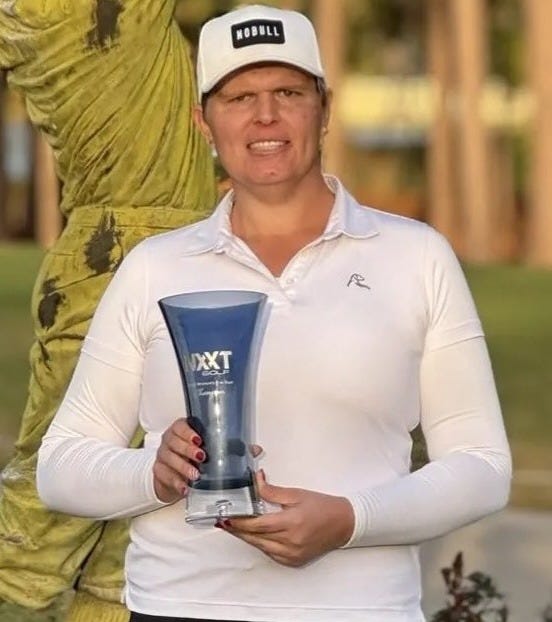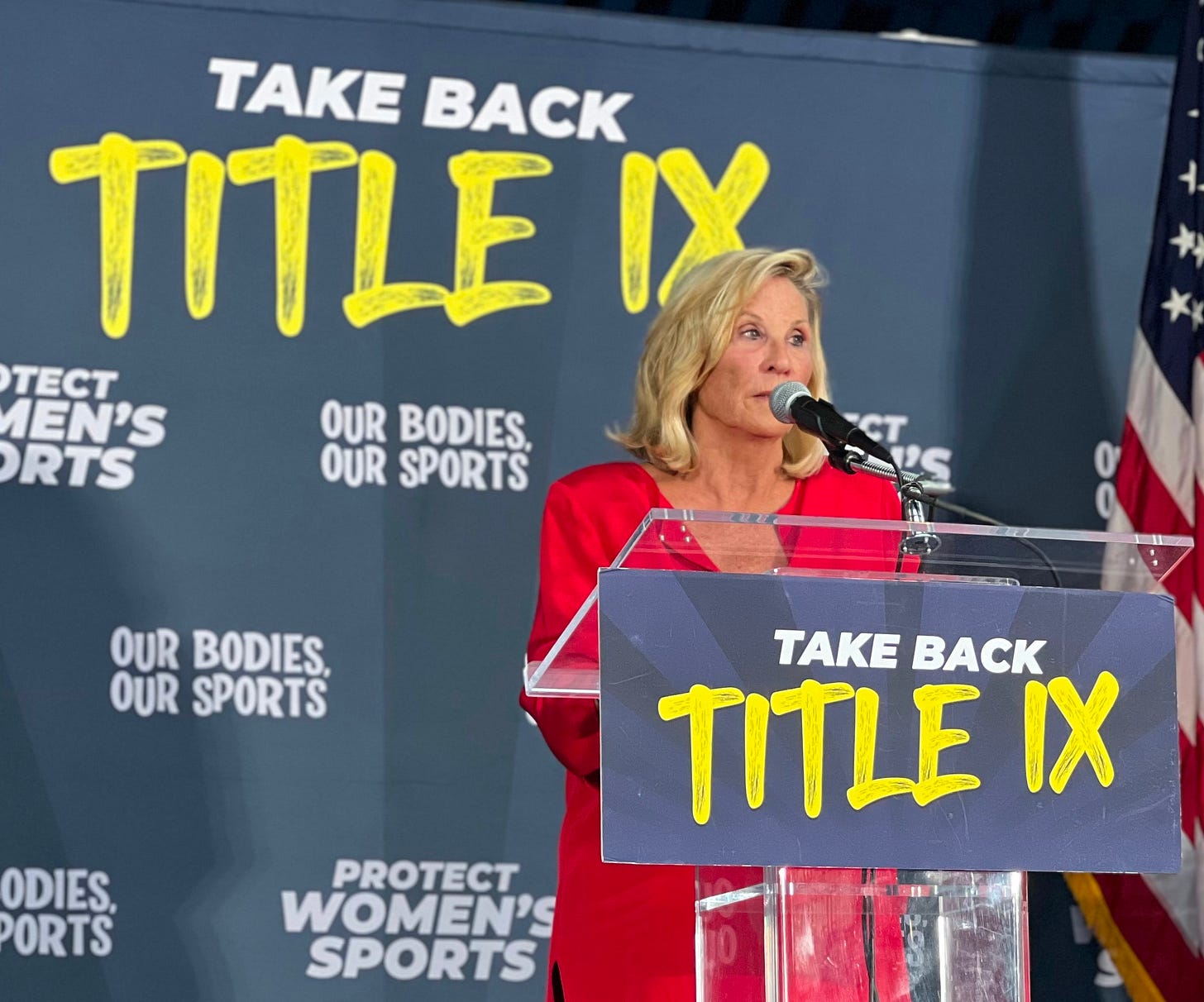How Sports Leaders Are Already Leading the Way with Solutions
Invitation and Call for Input in Preparation for Genspect Conference
Hi friends and welcome, new subscribers!
How are athletes succeeding at keeping sports female-only? I’d love to hear your thoughts on any developments, large or small.
I’m excited to announce that I’ll be speaking at Genspect’s “The Bigger Picture” conference on September 27 and 28, 2025, in Albuquerque, New Mexico. I’d love to see you there – and to hear any thoughts you might have as I plan my presentation.Today I’ll share some background about Genspect, outline my presentation, and invite your comments or suggestions on this draft.
What Is Genspect?
An international, nonpartisan, interdisciplinary organization, Genspect involves scientists, scholars, researchers, physicians, psychologists, sociologists, educators, lawyers, writers, feminists, philosophers, parents, teens, trans-identified people, and detransitioners as it “champions a healthy approach to sex and gender.”
Founded four years ago by Irish psychotherapist Stella O’Malley, Genspect already has an impressive track record, including:
Two podcasts:
and Beyond Gender;A community called Parents with Inconvenient Truth About Trans;
Stats for Gender, which offers reliable, user-friendly information;
Free “Beyond Trans” support groups for detransitioners and people harmed by medical transition;
Books, including When Kids Say They’re Trans;
Branches in Australia, New Zealand, the United States, Canada, the United Kingdom; and Ireland; and
An expose, “The WPATH Files: Pseudoscientific Surgical and Hormonal Experiments on Children, Adolescents, and Vulnerable Adults,” which reveals leaked files indicating widespread malpractice. WPATH stands for the World Professional Association for Transgender Health. It advocates for so-called gender-affirming medical care, including life-altering and sterilizing hormones and surgery for children. WPATH guidelines, used by medical groups, recently removed all lower age limits on hormones and surgeries, a standard advocated by Rachel Levine, the trans-identified former assistant secretary at the Department of Health and Human Services.
I have attended previous Bigger Picture conferences remotely and attended my first in-person Genspect meeting at Detrans Awareness Day on Capitol Hill in March.
Can you tell I’m a fan?
Why are athletes succeeding at keeping sports female-only?
WPATH Counter-Campaign
Since 2022, Genspect has ingeniously engaged in a “counter-campaign” against WPATH by scheduling the Bigger Picture conferences near WPATH conferences – and at the same time. They invite WPATH attendees to drop by. Genspect says WPATH “promotes the weakening of healthy bodies through unnecessary, radical, and reckless interventions.”
What will I be saying?
My presentation is called “How Sports Leaders Are Already Leading the Way with Solutions.” I’ll discuss significant victories thus far, proposing that an analysis of athletes’ efforts to restrict female sports to actual females could help solve gender-related challenges in other fields.
First, I plan to list tangible wins, such as:
Policies and Laws: Since 2022, the powerful international federations of track, cycling, swimming, rowing, boxing, golf, rugby, powerlifting, and mixed martial arts have all revised their policies to restrict female sports to females, as have the National Collegiate Athletic Association and twenty-seven states in the U.S.
Public opinion: A January 2025 New York Times/Ipsos poll found that 79 percent of Americans oppose males in female sports, up from 67 percent in 2023.
Government: While I abhor the Trump administration, I must note that Presidential executive orders are having an effect, especially the United States’ opposition to male participation in women’s sports.
International trends: The U.K. Supreme Court has recognized that women's legal rights are based on sex, not gender identity.1 The ruling will affect every arena in which sex matters, including prisons, schools, universities, medical care, restrooms – and sports and locker rooms.
Question #1 for you: How else are athletes succeeding at keeping sports female-only?
Next, I plan to analyze why athletes and our allies are succeeding. For instance:
1) We’re fortunate.
Sports are visible and relatable, with the basic concepts easily understood.
Sports data and images are plentiful and provide persuasive evidence that men are bigger, stronger, faster, and taller than women in virtually every sport; that such advantages begin in utero; and that women need private changing spaces. We use multiple platforms to take our case to the public, sport governing bodies, and politicians.
Parents are protective of their daughters and not inclined to abandon their them as they encounter males on their playing fields and in their locker rooms.

2) We laid the groundwork by establishing the value of women’s sports through decades of activism.
Sports have been in the forefront of other social movements, including feminism and civil rights.
The public now values women’s sports, appreciates Olympic and other visible victories, and understands that girls and women gain confidence, courage, and competitiveness through athletics.
3) Our leaders are champions with a history of teamwork, persistence, and strategic success. We deploy lessons learned through sports expertise and advocacy.
The Women's Sports Policy Working Group, for instance, is comprised of veteran athletes and advocates with gravitas, celebrity, influence, and connections. ICONS was founded by two champion athletes after Lia Thomas’s NCAA swimming victory catalyzed the female-only sports movement. Champion Women is a legal powerhouse founded by an Olympic champion.
We collaborate with sports-related groups through the International Consortium for Female Sport; feminist groups; and scientists across the political spectrum and across gender-critical domains.
We use a variety of tactics to educate and persuade, including lawsuits.
We collaborate intergenerationally, as young female athletes are increasingly finding their voices.
We tried to collaborate with trans activists. The Women's Sports Policy Working Group met with two trans allies for a year before failing to find enough common ground to proceed. Overtures to other trans activists have all been rebuffed, but we do have four trans-identified supporters.
We evolve. We don’t say “transgender women and girls” or “biological males” anymore. Instead, “We Need to Refer to Male Athletes as Male,” as Martina Navratilova says.
We center women and girls.
We refuse to be intimidated despite significant harassment.1
Question #2 for you: How should I expand or revise this list? What’s your interpretation of why athletes are succeeding in our efforts to keep female sports female, if you agree that we are?

Question #3: Other thoughts? Anything you hope I address? I welcome all comments, as always.
Reminder: Sign up!
Albuquerque is a beautiful city featuring rich culture and heritage, stunning Sandia Mountains, blue-corn tortillas, and the Petroglyph National Monument. (I attended high school in Arizona, love the Southwest, and am obsessed with petroglyphs.) In-person slots sell out quickly. A remote option is available.
I’d love to see you there.
See also: related stories in my #SaveWomensSports section.
Unlike my last three speeches, this speech will not be cancelled. Genspect is the ultimate un-canceler: open invitations, open minds, open hearts.






That you will be a speaker at Genspect is fantastic news, and your outline of points you intend to cover portends that your speech will be informative, inspiring, and actionable.
I particularly appreciated this point in your list: “Our leaders are champions with a history of teamwork, persistence, and strategic success. We deploy lessons learned through sports expertise and advocacy.” It reminds us, once again, that young women athletes, precisely because they have these skills, are very often tomorrow’s leaders (and in fact, we are already seeing many of them lead the way today, like the high schoolers who have spoke up on behalf of protecting the female category at their school boards).
I do have a question/suggestion: it would be terrific to have yours and the Working Group’s guidance on concrete, manageable “asks” we, as individuals, can make, whether athletes or not, to press lawmakers who remain benighted on these issues to do the right thing by women and girls. At ROAR, for example, we put out a call to action aimed at Democratic US Senators, after they voted against S. 9, to convene a meeting with the Women’s Sports Policy Working Group and consult with the group, eg, to arrive at a legislative proposal that, in your wonderful words, allows for both “Fairness + Decency. We can hold both things.”
We did that on our own, not knowing whether it was the best “ask,” but out of a sense of urgency to keep the heat on these Senators. We actually still get the occasional “hit” on that call, which suggests to us there are many out there, aware or becoming aware, who would like to raise their voices with their electeds, but could use help arriving at a good “ask.”
(Here’s a link to that call, FYI: https://roarwomennyc.com/2025/03/10/call-to-action-tell-your-us-democratic-senators-to-meet-with-the-womens-sports-policy-working-group-asap/)
Most of all, enormous applause to you and all the other wonderful athletes who are leading the charge here. Your work inspires us all.
Brava, Mariah!
I can't be there in person but will be there in spirit.
Thank you for all you do for women.